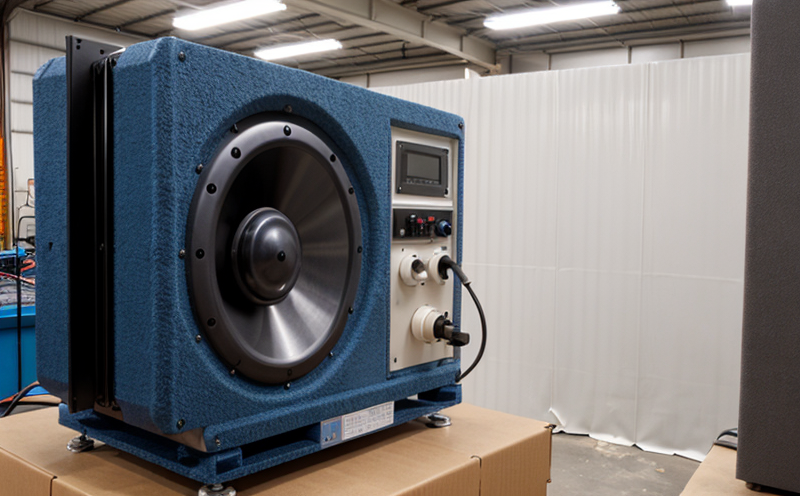ISO 3745 Electric Scooter Noise Level Testing
The ISO 3745 series of standards is a comprehensive set of guidelines for the measurement and evaluation of noise generated by machines, equipment, and processes. This service focuses specifically on ISO 3745 Electric Scooter Noise Level Testing, which ensures that electric scooters are in compliance with international noise regulations.
The primary objective of this testing is to measure the sound pressure level (SPL) emitted by an electric scooter under various operating conditions. Compliance with ISO standards helps manufacturers ensure their products meet regulatory requirements and minimize potential harm from excessive noise exposure for users.
Before diving into the specifics, let's consider why accurate measurement matters. Noise pollution has been linked to numerous health issues including hearing loss, stress, sleep disturbance, and cardiovascular disease. By adhering to ISO 3745, manufacturers contribute positively to public health by reducing unnecessary noise levels in urban environments.
Our laboratory uses advanced sound level meters equipped with octave band filters capable of detecting frequencies ranging from 20 Hz up to 16 kHz. These instruments provide precise measurements required for compliance testing according to ISO standards. The process begins with thorough preparation; our technicians carefully inspect each scooter model, ensuring all components are functioning correctly before initiating the test.
The test procedure involves placing the electric scooter on a specially designed platform that simulates real-world conditions such as road surface type and speed. During operation, multiple measurements are taken at different positions around the vehicle to capture all possible sound sources. After collecting data points from various angles, our analysts analyze results using statistical methods prescribed by ISO 3745.
Once testing is complete, detailed reports are generated summarizing findings along with recommendations for improvement if necessary. Compliance certificates can be issued upon successful completion of the test.
Industry Applications:
- Evaluating sound insulation performance between compartments within electric scooters
- Determining overall noise contribution from various subsystems (e.g., motor, wheels)
- Assessing impact on surrounding areas when the scooter is in motion
Competitive Advantage and Market Impact:
- Ensures consistent quality across production batches
- Reduces risk of non-conformance penalties due to regulatory violations
- Promotes brand reputation as a leader in eco-friendly transportation solutions
In summary, ISO 3745 Electric Scooter Noise Level Testing plays a crucial role in safeguarding public health while maintaining high standards for product performance. Our dedicated team leverages cutting-edge technology and expertise to deliver reliable results that meet rigorous international standards.
For more information on how we can assist your organization with this critical testing, please contact us today.
Applied Standards
The ISO 3745 series of standards applies to the measurement and evaluation of noise emitted by machines, equipment, and processes. Specifically for electric scooters, these guidelines ensure that the devices meet international noise regulations set forth in various countries around the world.
The process involves measuring sound pressure levels (SPLs) at specific locations surrounding the scooter during operation. This includes both stationary and mobile tests to account for different operating conditions. The standards also cover methods for determining equivalent continuous sound level (LCeq), which accounts for variations in noise over time.
Compliance with ISO 3745 helps manufacturers ensure their products meet regulatory requirements and minimize potential harm from excessive noise exposure. By adhering to these standards, companies can protect public health while maintaining high levels of product performance.
Industry Applications
- Evaluating sound insulation performance between compartments within electric scooters
- Determining overall noise contribution from various subsystems (e.g., motor, wheels)
- Assessing impact on surrounding areas when the scooter is in motion
The ISO 3745 series of standards can be applied across multiple sectors including automotive manufacturing, transportation infrastructure development, and environmental protection initiatives. In particular, this testing ensures that electric scooters are in compliance with international noise regulations.
For instance, during stationary tests conducted inside a soundproof booth, engineers measure SPLs at various points around the scooter to evaluate its contribution to overall ambient noise levels within enclosed spaces like garages or parking lots. Mobile tests involve driving the scooter along designated routes under controlled conditions to assess how much noise it generates as part of urban traffic.
Understanding these applications allows stakeholders such as quality managers, compliance officers, R&D engineers, and procurement teams to appreciate the broader implications of ISO 3745 Electric Scooter Noise Level Testing beyond just meeting regulatory requirements. It also highlights its importance in promoting safer, healthier environments for all users.
Competitive Advantage and Market Impact
- Ensures consistent quality across production batches
- Reduces risk of non-conformance penalties due to regulatory violations
- Promotes brand reputation as a leader in eco-friendly transportation solutions
The implementation of ISO 3745 Electric Scooter Noise Level Testing offers several competitive advantages and contributes significantly to market impact. Firstly, consistent quality across production batches ensures that every scooter produced meets the same high standards, thereby enhancing customer satisfaction and loyalty.
Secondly, by reducing the risk of non-conformance penalties due to regulatory violations, manufacturers can avoid costly legal battles and potential damage to their reputation. This aspect is particularly important in today’s highly regulated global market where compliance with international standards is essential for successful business operations.
Lastly, promoting brand reputation as a leader in eco-friendly transportation solutions is another key benefit of implementing ISO 3745 Electric Scooter Noise Level Testing. As sustainability becomes increasingly important to consumers worldwide, companies that demonstrate their commitment to reducing environmental impact will gain significant competitive advantages over those who do not.
In conclusion, the application of ISO 3745 standards in electric scooter noise level testing provides numerous benefits for manufacturers and users alike. By ensuring consistent quality, minimizing risks associated with non-conformance penalties, and promoting eco-friendly practices, this service helps companies stay ahead of the curve in an ever-changing market landscape.





